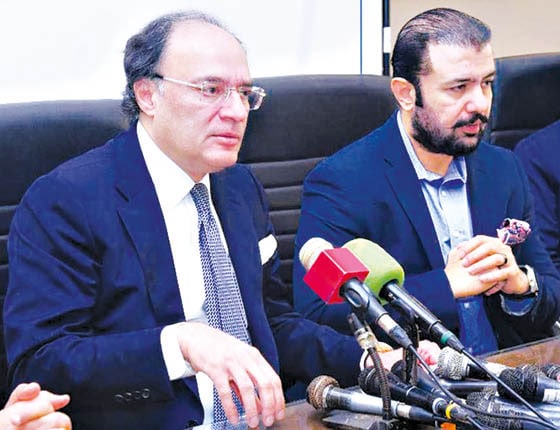Highlights export-led growth, investment, and key economic reforms; Remittances expected to exceed $35b; Urges continuity in economic policy regardless of govt in power
Federal Finance Minister Muhammad Aurangzeb has urged the private sector to step forward while the government will facilitate the economic turnaround.
Addressing an event, the finance minister said the foreign exchange reserves are improving, providing space to the government.
Aurangzeb said a better system for loans is needed and also called for timely intervention to prevent notable businesses from going bankrupt.
On Saturday, Muhammad Aurangzeb, expressed confidence in the positive direction of Pakistan’s economy, highlighting the influx of investments and the solid performance of existing investments.
Speaking to the media after a meeting with the Overseas Investors Chamber of Commerce and Industry, Aurangzeb discussed key topics such as structural reforms, taxation, energy, state-owned enterprises, and the privatization agenda. He emphasized the need for cooperation with current investors to drive economic growth.
Aurangzeb stated that the government’s role would be to provide a stable policy framework and continuity, which he described as crucial for attracting further investment. He encouraged private sector involvement, particularly advising businesses to include export components in their investment strategies.
Finance Minister Aurangzeb stressed the importance of continuity in the country’s economic policy, saying it should be consistent regardless of the government in power.
Acknowledging Pakistan’s import-dependent economy, the finance minister highlighted the challenges posed by the balance of payments issue. He stressed the need for export-led growth to break the boom-and-bust cycle and achieve sustained economic growth of 4-6%. “Every entity in the country must contribute to exports,” he added, noting the global demand for “Made in Pakistan” products. Addressing concerns about investor confidence, he referred to the SBP Investors Confidence Report but cautioned against complacency. Aurangzeb also pointed out that SOEs had incurred a loss of Rs 6 trillion over the past decade, underlining the need for private sector leadership.
Aurangzeb expressed optimism about the economic situation of the country, saying that the remittances are expected to surpass $35 billion in the current fiscal year 2024-25.
He attributed this positive projection to the government’s prudent economic policies. Aurangzeb stressed the significance of promoting “Made in Pakistan” products globally and underscored the necessity of measures to boost trade and investment.
On political stability, the minister reiterated that it was key to attracting investments, mentioning the daily loss of Rs 190 billion caused by political unrest and sit-ins. He stressed the importance of building tolerance and reaching a consensus across political administrations for a stable economy. “We must all be on the same page for a stable Pakistan,” he added.
Aurangzeb also discussed efforts to tackle smuggling, with petroleum volumes increasing due to crackdowns on illegal activities. He noted that illegal gas stations had been sealed and shops selling illicit cigarettes had been warned.
Regarding taxation, the minister revealed ongoing discussions with the Sindh government on agriculture tax and confirmed that Punjab, Khyber-Pakhtunkhwa, and Balochistan were also working on it. He emphasized the importance of broadening and deepening the tax base, including bringing sectors like real estate, agriculture, wholesalers, and retailers under the tax net. Digitalization, he said, was playing a vital role in curbing tax leakages in sales and income tax. On the issue of inflation, Aurangzeb announced that the Economic Coordination Committee had introduced a Standard Item Agenda to control the prices of essential goods, including pulses and petroleum. He urged Price Control Committees to remain active in monitoring and managing price increases, especially given recent declines in international market rates.









